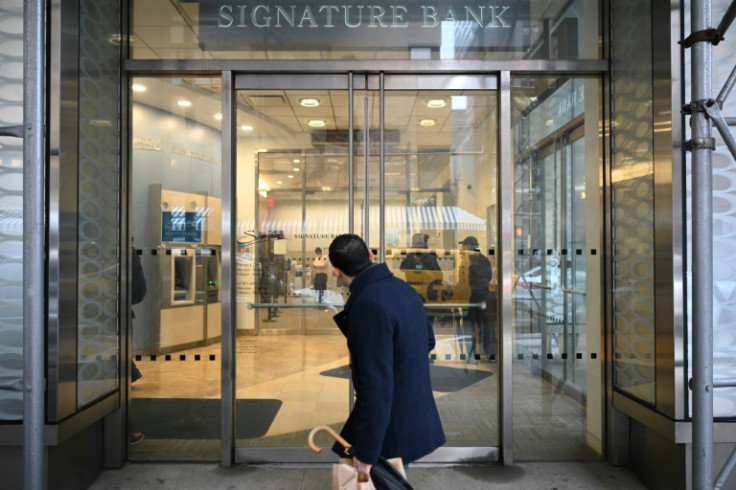New York Community Bancorp To Buy Failed Signature Bank Assets: Here's What We Know About The Takeover
KEY POINTS
- Flagstar will buy around $38.4 billion of Signature Bridge Bank's assets
- Around $60b of the bank's loans and $4 billion of its deposits would still remain with FDIC
- Flagstar will not buy $4 billion of deposits related to Signature's crypto unit Signet
Federal Deposit Insurance Corporation (FDIC) announced Sunday that a subsidiary of New York Community Bancorp has agreed to buy "substantially all" the assets of Signature Bank around a week after it collapsed.
Flagstar Bank of Hicksville, New York, has agreed to assume deposits and certain loan portfolios of Signature Bridge Bank, which operates under FDIC since the New York State Department of Financial Services closed Signature Bank on March 12, Reuters reported.
"As of December 31, 2022, the former Signature Bank had total deposits of $88.6 billion and total assets of $110.4 billion. Today's transaction included the purchase of about $38.4 billion of Signature Bridge Bank, N.A.'s assets, including loans of $12.9 billion purchased at a discount of $2.7 billion," FDIC said in a news release.
Even after the takeover, around $60 billion of Signature Bank's loans and $4 billion of its deposits would remain with it in receivership, FDIC said.
Under the new agreement, all 40 branches of the former Signature Bank will be operated by Flagstar Bank from Monday. Meanwhile, customers of Signature Bank have been advised to use their current branch until Flagstar Bank announces the availability of their full-service banking.
Flagstar will not buy $4 billion of deposits related to Signature's crypto unit Signet. The FDIC will provide these deposits directly to account holders.
"Depositors of Signature Bridge Bank, N.A., other than depositors related to the digital banking business, will automatically become depositors of the assuming institution," FDIC said.
Flagstar Bank was acquired by New York Community Bancorp in December 2022 for about $2.6 billion, making it to the top 25 banks in the country based on total assets at the time of acquisition.
Signature Bank's collapse was the third-largest bank failure in U.S. history. After three banks – Silvergate Bank, Silicon Valley Bank (SVB) and Signature Bank – collapsed one after the other within a week, the federal government took over their control to pay back depositors and broker sales.
The FDIC said the estimated cost of the failure of Signature Bank to its Deposit Insurance Fund will be around $2.5 billion, although the exact amount will be determined when it terminates the receivership.
Silicon Valley Bank (SVB), which regulators took over two days before Signature's failure, is still under FDIC receivership. The agency now plans to relaunch the sale process of SVB, which had $209 billion in assets after failing to attract buyers in its latest auction.
FDIC should be appreciated for the new deal and the move is considered a positive sign, Todd Baker, a senior fellow at Columbia University's Richard Paul Richman Center for Business, Law, and Public Policy, told Bloomberg.
"I particularly liked the FDIC getting an equity kicker based on the performance of NYCB's stock. This shows how the regulatory agencies are getting smarter," Baker said.
"Flagstar has gotten a very fair deal. And it doesn't surprise me that the FDIC is going to have to take a loss, in part because of the low quality of the remaining assets," Christopher Whalen, a banking analyst and chair of Whalen Global Advisors, told Finacial Times

© Copyright IBTimes 2024. All rights reserved.




















